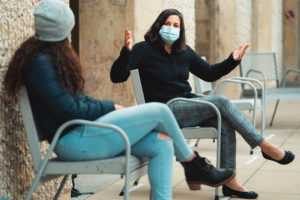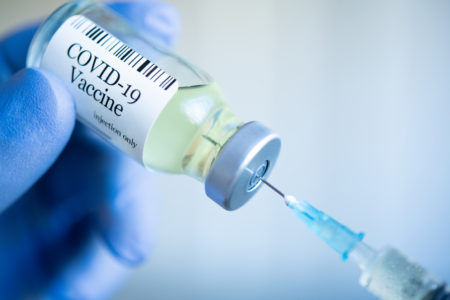Stanford Health Law Expert Michelle Mello on Biden’s New Vaccine Mandates
Yesterday, President Biden announced sweeping new mandates meant to push an estimated two-thirds of American workers to get the COVID-19 vaccine and stem the tide of the latest Delta wave of the pandemic. The move will require vaccines for health care workers, federal contractors, and the vast majority of federal workers—and require large employers to introduce a “vaccinate or test” plan for their workers. While the U.S. started its vaccination push earlier than most countries, eighteen months into the pandemic it is facing another huge surge of cases and deaths—largely in regions with low vaccination rates. Here, Stanford health law expert Michelle Mello discusses President Biden’s new mandates and the pandemic.
Do you think President Biden’s new mandates will make a significant difference in our fight against COVID?

It’s clear that the proportion of Americans who are fully vaccinated isn’t where we need it to be in order to contain the virus. The data also clearly show that communities with high vaccination coverage have far fewer COVID-19 cases, hospitalizations, and deaths than communities with lower coverage.
What’s less clear is how much the new mandates will move the needle on vaccination rates among the holdouts. On the one hand, it’s sensible to think that federal workers will respond to the threat of losing their jobs, and they’re a large group. Further, most healthcare facilities will welcome the political cover for taking action against unvaccinated workers, and the mandate could be quite helpful in addressing persistently low vaccination rates among lower-skilled healthcare workers such as nurse aides and environmental services workers.
But the Biden plan’s effect on employees of large companies is more uncertain. Although the employer policy is being referred to as a mandate, it actually just requires companies with 100 or more employees to ensure that their workers are either vaccinated or tested for SARS-CoV-2 at least weekly. Particularly if the employer makes tests readily available at no cost to employees, and if health insurers remain required to cover people’s cost-sharing for SARS-CoV-2 testing, employees opposed to vaccination may simply choose testing. That’s certainly a better outcome than having workers unvaccinated and untested, but we may not see a leap in vaccination rates.
We’ve already heard about possible pushback against these mandates, particularly from GOP governors. Are President Biden’s mandates legal? Does he have strong legal backing for the mandates?
Yes. The mandates were very carefully crafted to take advantage of the regulatory levers that the federal government has. The federal government doesn’t have the authority to impose a vaccination mandate on everyone, but it can do so where a constitutionally enumerated source of federal power is implicated. Here, the Biden Administration is using its authority to regulate matters substantially affecting interstate commerce, its power to attach conditions to federal spending (for example, Medicare payments to hospitals and Medicaid payments to nursing homes), and its authority to set the conditions of work for its own employees and contractors.
Nevertheless, in the current political climate, legal challenges are inevitable. Because healthcare facilities generally want their employees to be vaccinated, I don’t anticipate that they’ll be a major source of pushback. But other businesses and individual employees certainly will be. I think these challenges will ultimately fail, but I’ve been surprised at the willingness of a few district court judges to issue temporary restraining orders and preliminary injunctions against other COVID-19-related measures until the lawsuits can be fully adjudicated on the merits. Such injunctive relief could delay progress on vaccination at this really critical time when we are in the throes of the Delta variant.
The president expressed his frustration with the unvaccinated during a press conference yesterday. “We’ve been patient,” Mr. Biden said in a sharp message to those who refuse to be vaccinated. “But our patience is wearing thin. And your refusal has cost all of us.” Can you talk about that cost—particularly as schools are starting and a significant percentage of our population is not eligible for the vaccine or immune compromised?

Delta poses a higher risk of transmission to vaccinated persons than earlier variants. Even though such “breakthrough” cases are rarely severe, decisions to forgo vaccination therefore affect the vaccinated majority. A lot of people are angry about that: unvaccinated individuals have set our country back substantially in terms of our return to normal civil life and a sense of safety.
I think this sense of frustration is especially acute among healthcare workers and facilities. In areas with low vaccination coverage, they are now coping for the third time with an overwhelming surge in cases and strain on their resources. But this time, the hospitalizations are almost completely preventable. It’s understandable that patience is wearing thin and burnout among physicians and nurses is so prevalent.
Then there are the kids. Although we know that in-person schooling poses a low risk of transmission when everyone wears masks and adheres to other COVID-19 protocols, the same communities that resist vaccination also resist those measures. The cost to kids—both in terms of getting sick and in terms of having their schooling disrupted further—is high. Just since school resumed this fall, over 24,000 kids in Atlanta’s school district have contracted COVID. Houston has seen 11,500 cases. Tampa schools have had to quarantine over 9,000 students. Of course, students contract COVID in the home and community as well as at school, and that makes them all the more vulnerable when the adults around them refuse vaccination for themselves and their teens.
While most kids experience mild COVID symptoms, pediatric hospitalizations and intensive care unit admissions are higher than ever in states with low rates of adult and teen vaccination. Another problem that is worrying my medical colleagues right now is the spectre of “long COVID” in kids. Researchers are just beginning to systematically look at how often kids with mild COVID infections suffer long-term health problems, but the early data are concerning.

When can we expect to see a COVID vaccine for children?
Timelines for the Food and Drug Administration (FDA) to issue marketing authorization for vaccines for young children keep shifting, and many parents are frustrated. The latest report is that data on the Pfizer-BioNTech vaccine will be submitted to the FDA within the next few weeks, but authorization won’t come in time to spare kids from the brunt of Delta. And again, because of Delta’s transmissibility, it’s critical that the people around children—not just the kids themselves—be vaccinated.
Do you have any words of caution regarding these new vaccine mandates?
As compelling as the evidence in favor of COVID-19 vaccines is, the issue of how broadly to require them is tricky. Last fall, vaccine experts and I laid out a series of trigger criteria we thought should be met before a COVID-19 vaccination mandate could be reasonable, and the U.S. has now met nearly all of them. But even when broadly applicable mandates are ethically and legally defensible, they won’t fully succeed unless (1) most people recognize them as legitimate and (2) there’s an effective way to enforce them against those who don’t. We’ve got problems on both those fronts right now. So I think the road ahead is going to be rocky.
Michelle Mello, Professor of Law and Professor of Health Research and Policy (School of Medicine), is a leading empirical health scholar whose research is focused on understanding the effects of law and regulation on health care delivery and population health outcomes. She was elected to the National Academy of Medicine (formerly known as the Institute of Medicine), one of the highest honors in the fields of health and medicine, in recognition of outstanding professional achievement and commitment to service.
